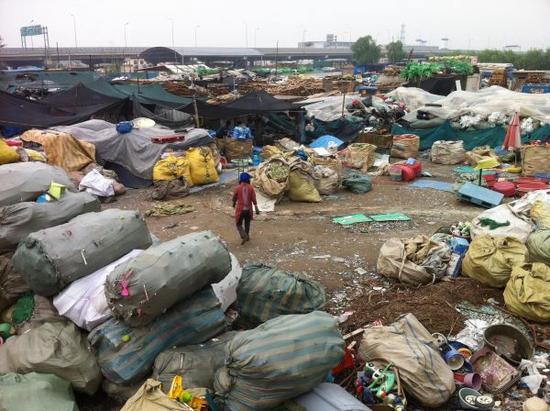Foreign Media Beijing scavengers: children play in garbage mountain | scavengers _ Beijing News

> Majuqiao Town, Tongzhou district, Beijing, Beijing, gather treasure, scrap company corner (August 28, 2013) Xinhua News Agency
Reference news, January 15 United Kingdom website on January 10, the guardian published the newspaper Daming, entitled the secret life of China's urban scavengers article, Chinese sociologist Hu Jiaming and Zhang 劼ying in Beijing scavengers living situation is described in the article.
Article says, people rarely stop to explore the trash went where and who is clean and they were classified. Living on the edge of the scavengers clear people don't want to see things. Sociologist Hu Jiaming and Zhang 劼ying in the new edition of the waste described in the book the lives of scavengers unknown living around Beijing. They came to the village of cold water, 50 kilometers north of Beijing, a group of scavengers working and living places.
Here's part of the story is predictable, mountains of garbage and a section of the drainage ditch, pets and children play in garbage. However, people here are generally clean and tidy, as is outside the environment Messier, family life becomes more tidy. Families from all over China constitutes a close community beyond blood relations. Following is the China dialogue website scavengers living dialogue with the author of the book:
Chinadialogue website: life of the waste recycling such as an informal economy. This informal process and officials have to do with recycling?
Zhang 劼ying: urbanization and industrialization of municipal solid waste is inevitable. In 2004, China replaced the United States as the world's largest producers of waste, but not all waste is dealt with by the Government, individual scavengers play an important role.
Hu Jiaming: Although we have said that this is unofficial, but the Government has been trying to turn these pickers into their management systems to address because of inadequate recycling of secondary problems such as pollution, but without success. Scavengers do not want to be included in the system. This has become a way of life, has its own set of morals. Some people think that this job more free than work in factories, not much of a face is not paid.
Chinadialogue website: How did you approach this group? Environment in which they live, and you expect the same?
Hu Jiaming: we and a number of colleagues working on problems of migrant workers came to the suburbs of Beijing, discover the special groups.
Hu Jiaming: I come from Hong Kong, before you see them, know little about scavengers. I realize that they paid the price for our shining city lifestyle. They ensure that we don't have to see junk or worrying about dirt and waste side of economic development.
Zhang 劼ying: when I began to study sociology at, I hope to find the "biggest victim". I'm at the bottom of society's group has a romantic fixation. After seeing them, I realized that that's not what happened. They are rational, they have their own rules, if you have the experience, or use a more technical, you'll do better.
Chinadialogue website: what rules?
Hu Jiaming: many people think that this is an unattractive job, we find that, in fact, hard to get a job. If you don't have a relationship, if you don't know already do the job of other people in the village, you will not start.
Zhang 劼ying: for example, scavengers will reach a mutually beneficial agreement with property companies. These companies need to clean up the garbage, but uses services provided by the Government means that they have to help carry the Junk loaded onto trucks. Scavengers will load on your own, and know how to negotiate and establish a stable relationship based on mutual trust, to ensure that they can handle the waste throughout the community.
Chinadialogue website: you say in the book, with the expansion of Beijing, scavengers continue to move into the distance, they now rent from farmers. Can you describe, where do these people live?
Hu Jiaming: trash is part of their lives. To save money, they work and live in the same place, they lived in the countryside around the yard House, piled in the yard to classified or unclassified waste. Summer days, there will be a stench. But we also see the family room very clean and tidy, contrasts sharply with the mess outside.
Zhang 劼ying: cold water village is almost an ecosystem. Local farmers and migrant workers rented State-owned enterprise and high-end area near the House. This is a complicated place.
Hu Jiaming: during the course of the middle class, real-estate developers to try to get this place. The past, scavengers will find their way into the city to work, but for now, they live too far away, increasing transportation costs. (Compile/Xu Yanhong)
Source: references
> Editor: Ni Zi Jiang
Article keywords:Beijing scavengers
I want feedback
Save a Web page
The future network
外媒探访北京拾荒者:孩子们在垃圾山中玩耍|北京拾荒者_新闻资讯

>北京通州区马驹桥镇的北京聚宝库废旧物资回收公司一角(2013年8月28日)新华社发
参考消息网1月15日报道 英国《卫报》网站1月10日刊登该报记者唐大明题为《中国城市拾荒者的神秘生活》的文章,中国社会学家胡嘉明和张劼颖在文中介绍了北京拾荒者的生活现状。
文章称,人们很少停下来探究垃圾都去了哪里以及是谁把它们清理走并进行了分类。生活在边缘 的拾荒者清理走了人们不想看到的东西。社会学家胡嘉明和张劼颖在新出版的《废品生活》一书中描述了北京周边拾荒者不为人知的生活。他们来到了北京以北50 公里处的冷水村,一个拾荒者群体工作生活的地方。
这里的部分情况是可以预见的,堆积如山的垃圾和一条条臭水沟,宠物和孩子们在垃圾当中玩 耍。然而,这里的人家通常都是干净整洁的,就像是外面的环境越混乱,家庭生活就会变得越整洁。来自中国各地的家庭构成了一个超越血缘关系的紧密社区。以下 是中外对话网站与该书作者就拾荒者生活的对话内容:
中外对话网站:《废品生活》把这种再循环作为一种非正式的经济。这一非正式过程与官方的废品回收有什么关系?
张劼颖:都市固体垃圾是城市化和工业化不可避免的产品。2004年,中国取代美国成为世界上最大的废品制造者,但并不是所有垃圾都是由政府处理,个体拾荒者发挥了重要作用。
胡嘉明:尽管我们说这是非官方的,但政府一直试图把这些拾荒者纳入其管理体制,以解决因不 充分的再循环而产生的二次污染等问题,然而没有成功。拾荒者不愿意被纳入体制。这已成为了一种生活方式,拥有它自己的一套工作道德。一些人认为,这份工作 比在工厂上班更自由,不太会面临不发工资的现象。
中外对话网站:你们是如何接近这个群体的?他们的生存环境和你们预想的一样吗?
胡嘉明:我们和一些致力于研究农民工问题的同事一起来到北京的郊区,发现了这一特别的群体。
胡嘉明:我来自香港,在见到他们之前,对拾荒者知之甚少。我意识到,他们为我们闪亮的城市生活方式付出了代价。他们确保了我们不必看到垃圾或者担心经济发展带来的肮脏和浪费的一面。
张劼颖:当我开始研究社会学时,我希望找到“最大的受害者”。我对处于社会最底层的群体有着浪漫化的固定看法。见到他们后,我意识到,事实并非如此。他们非常理性,他们有自己的行业规则,如果你有经验,或者使用了更多的技术,你就会做得更好。
中外对话网站:是什么样的规则?
胡嘉明:许多人认为,这是一份毫无吸引力的工作,但我们发现,其实很难获得这样一份工作。如果你没有关系,如果你不认识村里已经在做这份工作的其他人,你会无从下手。
张劼颖:比如,拾荒者会与物业公司达成互利协议。这些公司需要人手把垃圾清理走,但使用政府提供的服务意味着他们必须要帮着把垃圾装上卡车。而拾荒者会自己装车,而且知道如何谈判并建立稳定互信的关系,确保他们能处理整个小区的垃圾。
中外对话网站:你们在书中说,随着北京的扩大,拾荒者不断地往远处搬,他们现在开始从农民手里租房子。你们可以描述一下,这些人都住在哪里吗?
胡嘉明:垃圾是他们生活的一部分。为了省钱,他们工作和生活在同一个地方,他们住在农村院子周边的房子里,院子里堆着各种已分类或未分类的垃圾。夏天的时候,会有臭味。但我们还看到,一些家庭把房间收拾得非常干净整洁,与外面的脏乱形成鲜明对比。
张劼颖:冷水村几乎是一个生态系统。当地农民和农民工租下国有企业和高端小区附近的房屋。这是一个结构复杂的地方。
胡嘉明:在中产阶级化期间,房地产开发商设法获得这样的地方。过去,拾荒者仍会设法进入城市工作,但现在,他们住得太远了,交通成本不断增加。(编译/许燕红)
来源:参考消息
>责任编辑:倪子牮
文章关键词: 北京拾荒者
我要反馈
保存网页
未来网